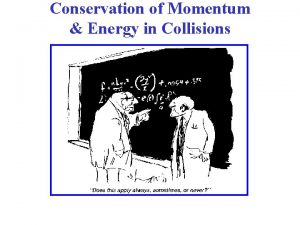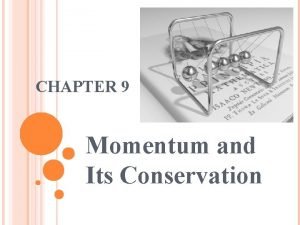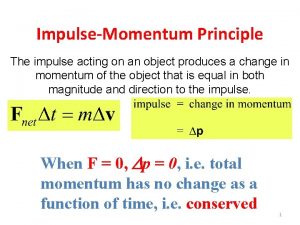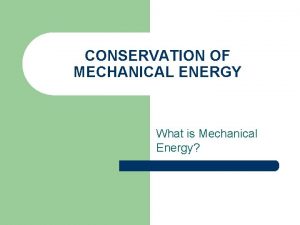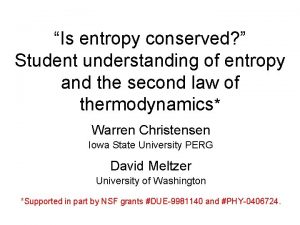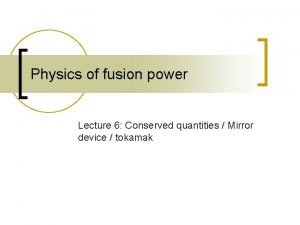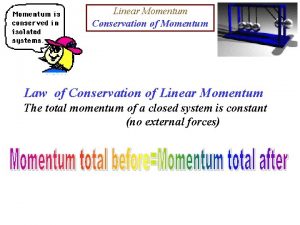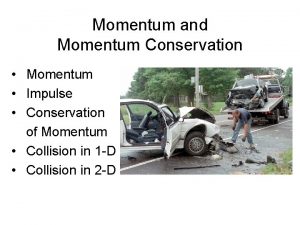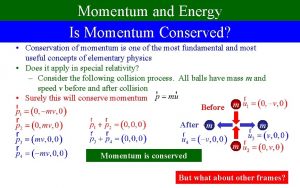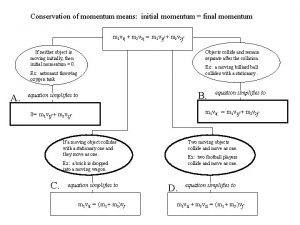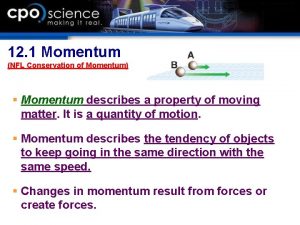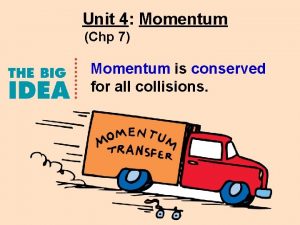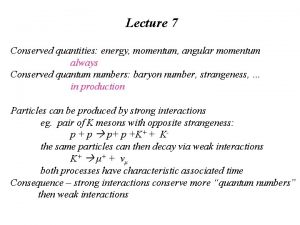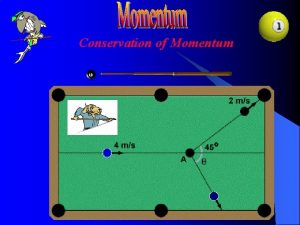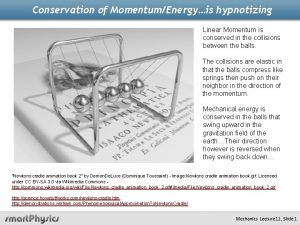Conservation of Momentum Momentum is Conserved So far



















- Slides: 19

Conservation of Momentum

Momentum is Conserved So far we only have considered the momentum of only one object at a time. Now we will look at two or more objects interacting with each other. Picture this. . . You are playing pool. You strike the cue ball it hits the 8 ball. The 8 ball had no momentum before they collided. • During the collision the cue ball loses momentum and the 8 ball gains momentum. • The momentum the cue ball loses is the same amount that the 8 ball gained. • •

Momentum is Conserved • The Law of Conservation of Momentum: The total momentum of all objects interacting with one another remains constant regardless of the nature of the forces between the objects. total initial momentum = total final momentum

Momentum is Conserved • The total momentum of all objects interacting with one another remains constant regardless of the nature of the forces between the objects. • Go back to the pool table example. The cue ball and the 8 ball do not have a constant momentum, but the total momentum is constant.

Momentum is Conserved • Consider objects pushing away from each other. • You jump up. You push of the Earth. Take you mv. • Lets say 60 kg m/s upward. That means that the Earth must have a corresponding momentum of 60 kg m/s downward. However, it has an enormous mass which means its velocity is very small.

Collisions • Two types of collisions • Elastic: Energy not dissipated out of kinetic energy • Bouncy • Inelastic: Some energy dissipated to other forms • Sticky • Perfect elasticity unattainable (perpetual motion)

Elastic Collision: Billiard Balls Whack stationary ball with identical ball moving at velocity vcue 8 To conserve both energy and momentum, cue ball stops dead, and 8 -ball takes off with vcue 8 Momentum conservation: mucue = mvcue + mv 8 -ball Energy conservation: ½mu 2 cue = ½mv 2 cue + ½mv 28 -ball The only way v 0 = v 1 + v 2 and v 20 = v 21 + v 22 is if either v 1 or v 2 is 0. Since cue ball cant move through 8 -ball, cue ball gets stopped. 8

Desk Toy Physics • The same principle applies to the suspended-ball desk toy, which eerily “knows” how many balls you let go… • Only way to simultaneously satisfy energy and momentum conservation • Relies on balls to all have same mass

CONSERVATION • So… momentum is conserved just as energy is conserved during elastic collisions according to:

Inelastic Collision • Energy not conserved (absorbed into other paths) • Non-bouncy: hacky sack, ball of clay Momentum before = m 1 u 1 Momentum after = (m 1 + m 2)v= m 1 u 1 (because conserved) Energy before = ½m 1 u 21 Energy after = ½ (m 1 + m 2)v 2 + heat energy

Example • A 76 kg boater, initially at rest in a stationary 45 kg boat, steps out of the boat and onto the dock. If the boater moves out of the boat with a velocity of 2. 5 m/s to the right, what is the final velocity of the boat?

Solution • Given: m 1 = 76 kg m 2 = 45 kg u 1 = 0 u 2 = 0 v 1 = 2. 5 m/s to the right Unknown: v 2 = ?

Solution • Choose an equation or situation: Because the total momentum of an isolated system remains constant, the total initial momentum of the boater and the boat will be equal to the total final momentum of the boater and the boat. m 1 u 1 + m 2 u 2 = m 1 v 1 + m 2 v 2

Solution • Because the boater and the boat are initially at rest, the total initial momentum of the system is equal to zero. Therefore, the final momentum of the system must also be equal to zero. m 1 u 1 + m 2 u 2 = 0 Rearrange the equation to solve for the final velocity of the boat.

Solution • Substitute the values into the equation and solve:

Solution • The negative sign for v 2 indicates that the boat is moving to the left, in the direction opposite the motion of the boater. Therefore, v 2 = 4. 2 m/s to the left

PRACTICE • A 63. 0 kg astronaut is on a space walk when the tether line to the shuttle breaks. The astronaut is able to throw a spare 10. 0 kg oxygen tank in a direction away from the shuttle with a speed of 12. 0 m/s, propelling the astronaut back to the shuttle. Assuming that the astronaut starts from rest with respect to the shuttle, find the astronauts final speed with respect to the shuttle after the tank is thrown.

PRACTICE • An 85. 0 kg fisherman jumps from a dock into a 135. 0 kg rowboat at rest on the west side of the dock. If the velocity of the fisherman is 4. 30 m/s to the west as he leaves the dock, what is the final velocity of the fisherman and the boat?

Momentum is Conserved • Newton’s third law leads to conservation of momentum • During the collision, the force exerted on each bumper causes a change in momentum for each car. • The total momentum is the same before and after the collision.
 Momentum is conserved
Momentum is conserved Momentum is conserved in all collisions
Momentum is conserved in all collisions Common velocity after collision formula
Common velocity after collision formula When is momentum conserved
When is momentum conserved Conservation momentum
Conservation momentum Momentum formula
Momentum formula Governor teacher inspector and visitor will break
Governor teacher inspector and visitor will break In a kingdom far far away
In a kingdom far far away Far far away city
Far far away city Cloudless at dawn figure of speech
Cloudless at dawn figure of speech Is impulse conserved
Is impulse conserved Conservation of mechanical energy
Conservation of mechanical energy Is entropy conserved
Is entropy conserved Conservation mechanical energy
Conservation mechanical energy Magnetic field drift
Magnetic field drift Work energy theorem
Work energy theorem Kinetic energy and gravity
Kinetic energy and gravity Conservation of momentum practice problems
Conservation of momentum practice problems State the principle of conservation of momentum
State the principle of conservation of momentum Law of conservation of momentum animation
Law of conservation of momentum animation


